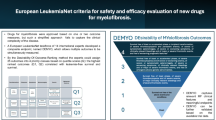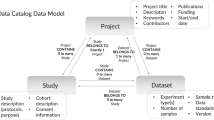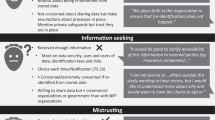Abstract
The purpose of this study was to explore patient and family views on the sharing of their medical data in the context of compiling a European leukodystrophies database. A survey questionnaire was delivered with help from referral centers and the European Leukodystrophies Association, and the questionnaires returned were both quantitatively and qualitatively analyzed. This study found that patients/families were strongly in favor of participating. Patients/families hold great hope and trust in the development of this type of research. They have a strong need for information and transparency on database governance, the conditions framing access to data, all research conducted, partnerships with the pharmaceutical industry, and they also need access to results. Our findings bring ethics-driven arguments for a process combining initial broad consent with ongoing information. On both, we propose key item-deliverables to database participants.
Similar content being viewed by others
Log in or create a free account to read this content
Gain free access to this article, as well as selected content from this journal and more on nature.com
or
References
Council recommendation COM (2009/C 151/02): Council ecommendation on an action in the field of rare diseases. http://ec.europa.eu/health/rare_diseases/key_documents/index_en.htm?Page=2.
Aymé S, Rodwell C : The European Union Committee of Experts on Rare Diseases: three productive years at the service of the rare disease community. Orphanet J Rare Dis 2014; 9: 30.
Boespflug-Tanguy O, Labauge P, Fogli A et al: Genes involved in leukodystrophies: a glance at glial functions. Curr Neurol Neurosci Rep 2008; 8: 217–229.
Kohlschütter A, Eichler F : Childhood leukodystrophies: a clinical perspective. Expert Rev Neurother 2011; 11: 1485–1496.
Godard B, Schmidtke J, Cassiman JJ et al: Data storage and DNA banking for biomedical research: informed consent, confidentiality, quality issues, ownership, return of benefits. A professional perspective. Eur J Hum Genet 2003; 11: S88–122.
Directive 95/46/EC of the European Parliament and of the Council of 24 October 1995 on the protection of individuals with regard to the processing of personal data and on the free movement of such data. 1995; 31-55.
European Commission: Regulation of the European Parliament and of the Council on the protection of individuals with regard to the processing of personal data and on the free movement of such data (General Data Protection Regulation) 2012. http://ec.europa.eu/justice/dataprotection/document/review2012/com_2012_11_en.pdf.
Mascalzoni D, Dove ES, Rubinstein Y et al: International charter of principles for sharing bio-specimens and data. Eur J Hum Genet 2014; 23: 721–728.
OECD: Principles and guidelines for access to research data from public funding 2007, http://www.oecd.org/dataoecd/9/61/38500813.pdf.
Strobl J, Cave E, Walley T : Data protection legislation: interpretation and barriers to research. BMJ 2000; 321: 890–892.
Vandenbroucke JP : Maintaining privacy and the health of the public should not be seen as in opposition. BMJ 1998; 316: 1331–1332.
Duchange N, Darquy S, d’Audiffret D et al: Ethical management in the constitution of a European database for leukodystrophies rare diseases. Eur J Paediatr Neurol 2014; 18: 97–603.
Farmer A, Aymé S, de Heredia ML et al: EURO-WABB: an EU rare diseases registry for Wolfram syndrome, Alström syndrome and Bardet-Biedl syndrome. BMC Pediatr 2013; 13: 130.
Eurordis policy fact sheet. Rare disease patient registries. 2013. www.eurordis.org/sites/default/files/publications/Factsheet_registries.pdf.
Moutel G, Duchange N, Raffi F et al: Communication of pharmacogenetic research results to HIV-infected treated patients: standpoints of professionals and patients. Eur J Hum Genet 2005; 13: 1055–1062.
Griggs RC, Batshaw M, Dunkle M et al: Clinical research for rare disease: opportunities, challenges, and solutions. Mol Genet Metab 2009; 96: 20–26.
Thornton H : The UK Biobank project: trust and altruism are alive and well: a model for achieving public support for research using personal data. Int J Surg 2009; 7: 501–502.
Almeida AM : Optimizing treatments in rare diseases: will our evidence come from registry data? Leuk Res 2014; 38: 421–422.
Bladen CL, Rafferty K, Straub V et al: The TREAT-NMD Duchene muscular dystrophy registries: conception, design, and utilization by industry and academia. Hum Mutat 2013; 34: 1449–1457.
Luchenski SA, Reed JE, Marston C et al: Patient and public views on electronic health records and their uses in the United Kingdom: cross-sectional survey. J Med Internet Res 2013; 15: e160.
Hansson MG : The need to downregulate: a minimal ethical framework for biobank research. Methods Mol Biol 2010; 675: 39–59.
Wendler D : One-time general consent for research on biological samples: is it compatible with the health insurance portability and accountability act? Arch Intern Med 2006; 166: 1449–1452.
Trinidad SB, Fullerton SM, Bares JM et al: Informed consent in genome-scale research: what do prospective participants think? AJOB Prim Res 2012; 3: 3–11.
Hansson MG : Ethics and biobanks. Br J Cancer 2008; 100: 8–12.
Gaskell G, Gottweis H, Starkbaum J et al: Publics and biobanks: Pan-European diversity and the challenge of responsible innovation. Eur J Hum Genet 2013; 21: 14–20.
McCormack P, Woods S, Aartsma-Rus A et al: Guidance in social and ethical issues related to clinical, diagnostic care and novel therapies for hereditary neuromuscular rare diseases: ‘translating’ the translational. PLoS Curr 2013; 10: 5.
European Commission: 25 recommendations on the ethical, legal and social implications of genetic testing. Guidelines 2004 http://ec.europa.eu/research/conferences/2004/genetic/pdf/report_en.pdf.
Grady C, Rubinstein YR, Groft SC : Informed consent and patient registry for the rare disease community: Editorial. Contemp Clin Trials 2011; 33: 3–4.
Gliklich RE, Dreyer NA, Leavy MB (eds): Registries for Evaluating Patient Outcomes, 3rd edn Agency for Healthcare Research and Quality: Rockville, MD, USA, 2014, http://www.ncbi.nlm.nih.gov/books/NBK208616/.
Curran WJ : Public health and the law. Informed consent and blanket consent forms. Am J Public Health 1971; 61: 1245–1246.
Caulfield T : Gene banks and blanket consent. Nat Rev Genet 2002; 3: 577.
Peppercorn J, Shapira I, Deshields T et al: Ethical aspects of participation in the Database of Genotypes and Phenotypes of the National Center for Biotechnology Information. Cancer 2012; 118: 5060–5068.
Hansson MG : Building on relationships of trust in biobank research. J Med Ethics 2005; 31: 415–418.
Master Z, Nelson E, Murdoch B et al: Biobanks, consent and claims of consensus. Nat Methods 2012; 9: 885–888.
Steinsbekk KS, Kåre Myskja B, Solberg B : Broad consent versus dynamic consent in biobank research: Is passive participation an ethical problem? Eur J Hum Genet 2013; 21: 897–902.
Kaye J, Whitley EA, Lund D et al: Dynamic consent: a patient interface for twenty-first century research networks. Eur J Hum Genet 2014; 23: 1–6.
Mascalzoni D, Hicks A, Pramstaller P et al: Informed consent in the genomics area. PLoS Med 2008; 5: e192.
Acknowledgements
This work was given EU FP7 program funding under Leukotreat Grant Agreement No. 241622. We thank the European Leukodystrophies Association (ELA) and its European network (Faveaux P, Duran MJ, Blondeau MC, Priamo P, Gosalbez Garcia A, Machiels C, de Miomandre G, Förstner G, Romano S). The authors are grateful to patients and their families who answered the questionnaire. We also thank the LeukoTreat Ethics Committee and the LeukoTreat referral–center partners. N Duchange and S Darquy are supported by the Institut National de la Santé et de la Recherche Médical (Inserm) as researchers.
Author information
Authors and Affiliations
Corresponding author
Ethics declarations
Competing interests
The authors declare no conflict of interest.
Rights and permissions
About this article
Cite this article
Darquy, S., Moutel, G., Lapointe, AS. et al. Patient/family views on data sharing in rare diseases: study in the European LeukoTreat project. Eur J Hum Genet 24, 338–343 (2016). https://doi.org/10.1038/ejhg.2015.115
Received:
Revised:
Accepted:
Published:
Issue date:
DOI: https://doi.org/10.1038/ejhg.2015.115
This article is cited by
-
Sharing is caring: a call for a new era of rare disease research and development
Orphanet Journal of Rare Diseases (2022)
-
A systematic literature review of attitudes towards secondary use and sharing of health administrative and clinical trial data: a focus on consent
Systematic Reviews (2021)
-
A systematic literature review of health consumer attitudes towards secondary use and sharing of health administrative and clinical trial data: a focus on privacy, trust, and transparency
Systematic Reviews (2020)
-
Members of the public in the USA, UK, Canada and Australia expressing genetic exceptionalism say they are more willing to donate genomic data
European Journal of Human Genetics (2020)
-
Model consent clauses for rare disease research
BMC Medical Ethics (2019)



